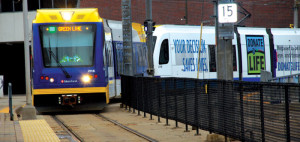
This past week, President Barack Obama has included Minnesota’s Southwest Light Rail Transit Line (SWLRT) in his 2017 budget recommendation, proposing that $125 Million be set aside for the light rail project. The SWLRT line spans 14.5 miles from Eden Prairie to Target Field.
Celebrating the news, Metropolitan Council Chairman Adam Duininck said in a press release, “The president’s budget demonstrates the federal government’s belief in the strong merits of this project.”
In 2016, the President included $150 million in his fiscal budget, which was the first installment of the anticipated 50 percent federal share for the $1.8 Billion light rail line. The SWLRT is the most expensive public works project in Minnesota state history. So far, the line has obtained 83 percent of its local funding, totaling $745 million, with commitments from the Counties Transit Improvement Board (CTIB), Hennepin County Regional Railroad Authority (HCRRA) and earlier funding from the state. The Met Council seeks to obtain the remaining $135 million in local dollars from the Republican-led Minnesota state legislature, which has previously said they will not fund this project. In January 2015, when asked about House Republicans support of the SWLRT funding package, Speaker of the House Kurt Daudt said, “We are not interested in moving forward on the Southwest light rail project. I think we need to get real with our priorities in Minnesota on how we spend our transportation dollars. Our plan is to spend them on roads and bridges.”
In order for the SWLRT to move forward, state and local authorities need to match federal money dollar-for-dollar and 2016 is a critical year for the project. Without state funding, the state legislature could put the kibosh on the entire project. If the legislature does approve state funding for the Southwest LRT, the Met Council can apply for full-funding grant status this summer and will potentially receive funding sometime in mid-2017. If the state legislature says no, the federal government would lose confidence in the project and potentially withdraw its commitment to fund it.










